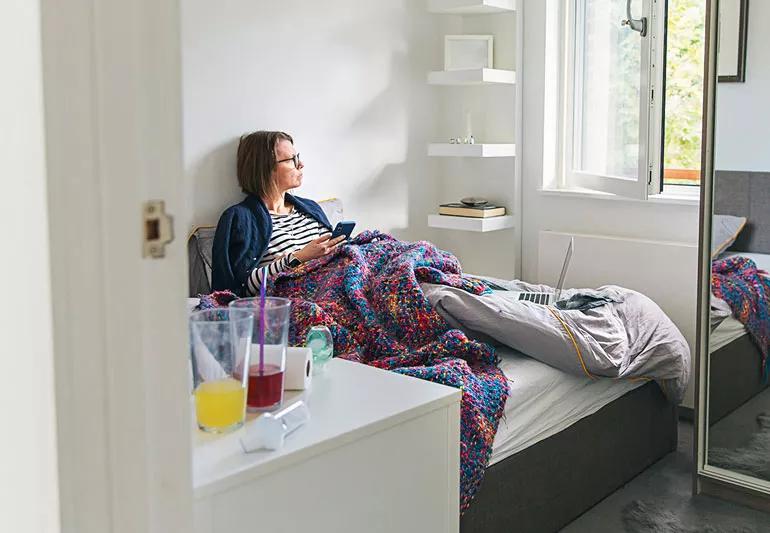
Your spouse develops a dry cough and says they feel feverish. Or your roommate starts feeling achy, exhausted and short of breath after finding out a coworker tested positive for COVID-19.
Cleveland Clinic is a non-profit academic medical center. Advertising on our site helps support our mission. We do not endorse non-Cleveland Clinic products or services. Policy
As cases continue surging across the country and new variants emerge, more and more people are finding themselves in these situations.
So, what should you do if someone in your household starts showing COVID-19 symptoms or tests positive for the virus? Here’s some guidance on how to care for someone who has COVID-19 while limiting the chances that the virus will spread easily in your household.
The coronavirus mainly spreads when people who are infected come in close contact with others. A home where people spend many hours a day together is a prime spot for this to happen.
“Right now, we’re seeing a lot of infectivity in homes, where someone who’s sick infects other people they live with,” says James Merlino, MD, Chief Clinical Transformation Officer.
A study supported by the Centers for Disease Control and Prevention (CDC) confirmed that it’s common for the coronavirus to spread among people in a household — often early after one person starts feeling sick.
But it’s not inevitable, and there are steps you can take to prevent it from happening.
Experts agree that it’s best for someone who’s sick with COVID-19 symptoms or who tests positive for the virus to isolate themselves as soon as possible.
Ideally, this means they should stay in a separate bedroom and preferably use a separate bathroom, too.
However, if you live in close quarters and aren’t able to do this, create as much air circulation as possible in your home by opening the windows if it’s warm enough outside to do so.
“If you have to be in close proximity to the person who is sick, you can all wear masks,” Dr. Merlino says. “But trying to keep people separated as much as possible is the best thing you can do.”
According to the CDC, the person who’s sick should isolate for five days, and if they aren’t experiencing symptoms or their symptoms are resolving (without fever for 24 hours), they should then follow that isolation with five days of wearing a mask when around others to minimize the risk of infecting people they encounter.
If you can’t avoid close contact with the person in your home who is sick, the CDC recommends that you also stay home while they isolate. This will ensure that you don’t risk spreading COVID-19 to others outside of your home. Watch for fever, cough, shortness of breath or other COVID-19 symptoms.
Often, people who get sick with COVID-19 can recover safely at home. They’ll need plenty of rest and likely some help from others so they can stay isolated. If you’re considered high-risk for getting very sick with COVID-19, you should avoid being the caretaker for the person if you can.
The first step is to make sure whoever is sick is in contact with a healthcare provider. They may be advised to get tested for COVID-19, or just stay home and monitor symptoms.
If they test positive or are assumed to have the virus, here’s how to care for someone with COVID-19:
Caring for your family member or housemate who has COVID-19 while also protecting yourself will require some care and caution. Experts recommend that you:
“COVID-19 often gets in through the back door — it spreads when someone loosens up on precautions or when a family member isn’t careful,” Dr. Merlino says. “So we have to be very vigilant with these precautions.”